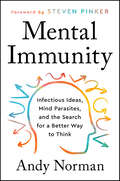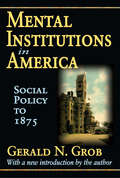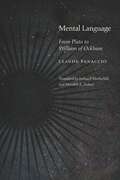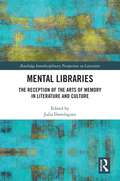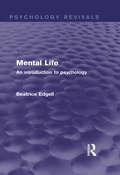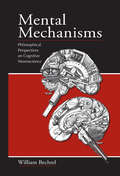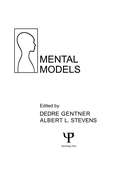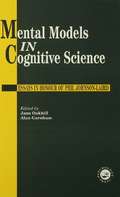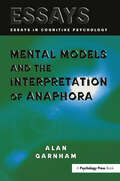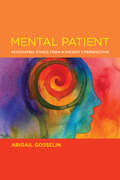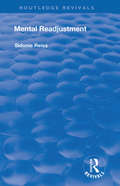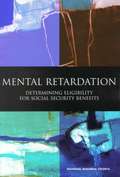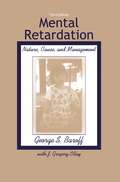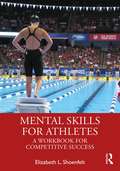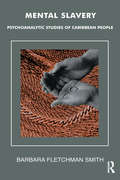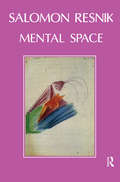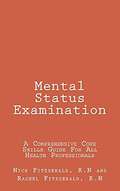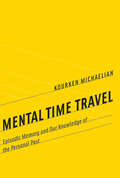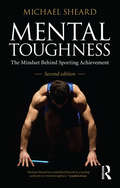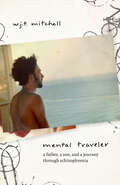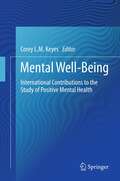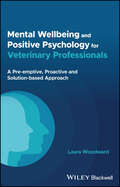- Table View
- List View
Mental Immunity: Infectious Ideas, Mind-Parasites, and the Search for a Better Way to Think
by Andy Norman“Mental Immunity is the perfect vaccine for the mind-viruses infecting our culture: alternative facts, fake news, and conspiracy thinking, to name a few.” —Michael Shermer, publisher of Skeptic magazine and author of The Believing BrainAstonishingly irrational ideas are spreading. Covid denial persists in the face of overwhelming evidence. Anti-vaxxers compromise public health. Conspiracy thinking hijacks minds and incites mob violence. Toxic partisanship is cleaving nations, and climate denial has pushed our planet to the brink. Meanwhile, American Nazis march openly in the streets, and Flat Earth theory is back. What the heck is going on? And what can we do about it? In Mental Immunity, Andy Norman shows that these phenomena share a root cause. We live in a time when the so-called “right to your opinion” is thought to trump our responsibilities. The resulting ethos effectively compromises mental immune systems, allowing “mind parasites” to overrun them. Conspiracy theories, evidence-defying ideologies, garden-variety bad ideas: these are all species of mind parasite, and each of them employs clever strategies to circumvent mental immune systems. In fact, some of them compromise cultural immune systems—the things societies do to prevent bad ideas from spreading. Norman shows why all of this is more than mere analogy: minds and cultures really do have immune systems, and they really can break down. Fortunately, they can also be built up: strengthened against ideological corruption. He calls for a rigorous science of mental immune health—what he calls “cognitive immunology”—and explains how it could revolutionize our capacity for critical thinking.A practical guide to spotting and removing bad ideas, Mental Immunity is a stirring call to transcend our petty tribalisms, and a serious bid to bring humanity to its senses.
Mental Institutions in America: Social Policy to 1875
by Robert GolembiewskiMental Institutions in America: Social Policy to 1875 examines how American society responded to complex problems arising out of mental illness in the nineteenth century. All societies have had to confront sickness, disease, and dependency, and have developed their own ways of dealing with these phenomena. The mental hospital became the characteristic institution charged with the responsibility of providing care and treatment for individuals seemingly incapable of caring for themselves during protracted periods of incapacitation.The services rendered by the hospital were of benefit not merely to the afflicted individual but to the community. Such an institution embodied a series of moral imperatives by providing humane and scientific treatment of disabled individuals, many of whose families were unable to care for them at home or to pay the high costs of private institutional care. Yet the mental hospital has always been more than simply an institution that offered care and treatment for the sick and disabled. Its structure and functions have usually been linked with a variety of external economic, political, social, and intellectual forces, if only because the way in which a society handled problems of disease and dependency was partly governed by its social structure and values.The definition of disease, the criteria for institutionalization, the financial and administrative structures governing hospitals, the nature of the decision-making process, differential care and treatment of various socio-economic groups were issues that transcended strictly medical and scientific considerations. Mental Institutions in America attempts to interpret the mental hospital as a social as well as a medical institution and to illuminate the evolution of policy toward dependent groups such as the mentally ill. This classic text brilliantly studies the past in depth and on its own terms.
Mental Language: From Plato to William of Ockham (Medieval Philosophy: Texts and Studies)
by Claude PanaccioThe notion that human thought is structured like a language, with a precise syntax and semantics, has been pivotal in recent philosophy of mind. Yet it is not a new idea: it was systematically explored in the fourteenth century by William of Ockham and became central in late medieval philosophy. Mental Language examines the background of Ockham's innovation by tracing the history of the mental language theme in ancient and medieval thought.Panaccio identifies two important traditions: one philosophical, stemming from Plato and Aristotle, and the other theological, rooted in the Fathers of the Christian Church. The study then focuses on the merging of the two traditions in the Middle Ages, as they gave rise to detailed discussions over the structure of human thought and its relations with signs and language. Ultimately, Panaccio stresses the originality and significance of Ockham's doctrine of the oratio mentalis (mental discourse) and the strong impression it made upon his immediate successors.
Mental Libraries: The Reception of the Arts of Memory in Literature and Culture (Routledge Interdisciplinary Perspectives on Literature)
by Julia DomínguezMental Libraries: The Reception of the Arts of Memory in Literature and Culture explores the enduring legacy of mnemonic systems across literature, visual arts, pedagogy, and cultural production.Centered on the metaphor of the “mental library,” this collection reveals how memory practices functioned as tools for knowledge storage as well as generative frameworks for creativity and invention. The 13 essays trace the reception, adaptation, and transformation of the ars memoriae from late medieval Europe to early modern Spain, Italy, France, and Latin America. Contributors examine canonical figures like Petrarch, Bruno, and Burton, alongside lesser‑explored thinkers such as Bartolomeo da Mantova, Zorrilla, and Carrara. With insights from renowned scholars such as Lina Bolzoni and Luis Merino Jerez, this volume offers fresh perspectives on the cultural and intellectual impact of mnemonic systems.Rich in visual content and interdisciplinary analysis, Mental Libraries bridges past and present, inviting readers to rethink the role of memory in shaping knowledge, literature, and culture.
Mental Life: An Introduction to Psychology (Psychology Revivals)
by Beatrice EdgellOriginally published in 1926, the aim of this textbook was the ‘interpretation of human behaviour and conduct’. Beatrice Edgell is an important figure in the history of psychology. She was the first British woman to receive a PhD in psychology, the first female psychology professor in Britain and the first woman president of the British Psychological Society (1930-1931), of which she had been a founding member in 1901. As the Head of Psychology at Bedford College, she established one of the first psychological laboratories in the UK. She also taught a number of women who went on to become prominent in the field. One of her many publications this book was thought to be ‘suitable for students training for social work or for the general reader interested in educational and social questions’.
Mental Logic
by Martin D. S. Braine David P. O'Brien Martin BraineOver the past decade, the question of whether there is a mental logic has become subject to considerable debate. There have been attacks by critics who believe that all reasoning uses mental models and return attacks on mental-models theory. This controversy has invaded various journals and has created issues between mental logic and the biases-and-heuristics approach to reasoning, and the content-dependent theorists. However, despite its pertinence to current issues in cognition, few cognitive scientists really know what the mental-logic theory is, and misapprehensions are prevalent. This volume is a comprehensive presentation of the theory of mental logic and its implications for cognition and development, including the acquisition of language. The theory offered here has three parts. Part I is the mental logic per se that contains a set of inference schemas. Part II is a reasoning program that applies the schemas in lines of reasoning, including a direct-reasoning routine and more sophisticated indirect-reasoning strategies. Part III of the theory is pragmatic, proposing that the basic meaning of each logic particle is in the inferences that are sanctioned by its inference schemas.
Mental Mechanisms: Philosophical Perspectives on Cognitive Neuroscience
by William BechtelA variety of scientific disciplines have set as their task explaining mental activities, recognizing that in some way these activities depend upon our brain. But, until recently, the opportunities to conduct experiments directly on our brains were limited. As a result, research efforts were split between disciplines such as cognitive psychology, li
Mental Models
by Dedre Gentner Albert L. StevensThis classic volume compiles and describes interdisciplinary research on the formal nature of human knowledge about the world. Three key dimensions that characterize mental models research are examined: the nature of the domain studied, the nature of the theoretical approach, and the nature of the methodology.
Mental Models In Cognitive Science: Essays In Honour Of Phil Johnson-Laird
by Alan Garnham Jane OakhillPhil Johnson-Laird's theory of mental models has proved to be an influential development in the cognitive sciences. This theory aims to provide a detailed account of both reasoning and inference on the one hand, and language on the other. It can therefore be regarded as a step toward the much-sought-after unified theory of cognition.; This book provides an overview of mental models research. Some of the contributors were collaborators or former graduate students of Johnson-Laird, and between them they cover the main strands of mental models theory. After an appreciation of Johnson-Laird, the book covers topics including language Processing, Reasoning, Inference, The Role Of Emotions, And The Impact Of mental illnesses on thought processes.
Mental Models and the Interpretation of Anaphora (Essays in Cognitive Psychology)
by Alan GarnhamThe interpretation of anaphora - how we interpret expressions such as definite pronouns (he, she, it) and verbal elliptical phrases (such as "did so, too") in the course of ordinary conversation or reading - is an important aspect of language comprehension. In this book the author examines the research and evidence on anaphor interpretation within the context of the mental models theory of comprehension, arguing that the notion of a mental model is essential to the detailed description of the processes of anaphor resolution. The general philosophy of the mental models approach and the nature of mental models themselves and their role in language processing is discussed, followed by a review of methodological issues that bear on the interpretation of psychological research findings. Against this background, the author's own research on areas such as deep and surface anaphora, reference into anaphoric islands, the role of implicit causality in anaphor resolution and the use of pronouns to refer to characters introduced by stereotyped role names is presented.At all times the author's research is set within the context of the general literature on anaphor resolution derived from the disciplines of linguistics, psycholinguistics, philosophy and computational linguistics, ensuring that the book will be of interest to advanced students and researchers in these fields.
Mental Patient: Psychiatric Ethics from a Patient’s Perspective (Basic Bioethics)
by Abigail GosselinA philosopher who has experienced psychosis argues that recovery requires regaining agency and autonomy within a therapeutic relationship based on mutual trust.In Mental Patient, philosopher Abigail Gosselin uses her personal experiences with psychosis and the process of recovery to explore often overlooked psychiatric ethics. For many people who struggle with psychosis, she argues, psychosis impairs agency and autonomy. She shows how clinicians can help psychiatric patients regain agency and autonomy through a positive therapeutic relationship characterized by mutual trust. Patients, she says, need to take an active role in regaining their agency and autonomy—specifically, by giving testimony, constructing a narrative of their experience to instill meaning, making choices about treatment, and deciding to show up and participate in life activities. Gosselin examines how psychotic experience is medicalized and describes what it is like to be a patient receiving mental health care treatment. In addition to mutual trust, she says, a productive therapeutic relationship requires the clinician&’s empathetic understanding of the patient&’s experiences and perspective. She also explains why psychotic patients sometimes feel ambivalent about recovery and struggle to stay committed to it. The psychiatric ethics issues she examines include the development of epistemic agency and credibility, epistemic justice, the use of coercion, therapeutic alliance, the significance of choice, and the taking of responsibility. Mental Patient differs from straightforward memoirs of psychiatric illness in that it analyses philosophic issues related to psychosis and recovery, and it differs from other books on psychiatric ethics in that its analyses are drawn from the author&’s first-person experiences as a mental patient.
Mental Readjustment (Routledge Revivals)
by Sidonie ReissPublished in 1949, this essay on child psychology and psychotherapy should be of especial interest to all parents and teachers of young children. Sidonie Reiss, who is a disciple of Adler, shows how his “individual psychology” enables one to deal with the problem of the difficult and maladjusted child - and especially the problem of the “spoilt” or “cosseted” child, who is commonly “the baby of the family,” though, as the authoress shows, the eldest child, and even the child of intermediate age, is liable to develop characteristic symptoms. Such troubles as over-compensation of the inferiority complex, exhausting efforts to rival or eclipse an older child, or attempts to achieve a spurious and showy success, or morbid discouragement, are traced to their original causes, and the problems of psychotherapeutic treatment and prevention are elucidated. The latter part of the book is devoted to a number of typical cases which reveal how mal-adjustment arose, what symptoms it displayed, and how the victims were brought back to a happier condition of mind.
Mental Retardation: Determining Eligibility For Social Security Benefits
by Committee on Disability Determination for Mental RetardationCurrent estimates suggest that between one and three percent of people living in the United States will receive a diagnosis of mental retardation. Mental retardation, a condition characterized by deficits in intellectual capabilities and adaptive behavior, can be particularly hard to diagnose in the mild range of the disability. The U.S. Social Security Administration (SSA) provides income support and medical benefits to individuals with cognitive limitations who experience significant problems in their ability to perform work and may therefore be in need of governmental support. Addressing the concern that SSA’s current procedures are consistent with current scientific and professional practices, this book evaluates the process used by SSA to determine eligibility for these benefits. It examines the adequacy of the SSA definition of mental retardation and its current procedures for assessing intellectual capabilities, discusses adaptive behavior and its assessment, advises on ways to combine intellectual and adaptive assessment to provide a complete profile of an individual's capabilities, and clarifies ways to differentiate mental retardation from other conditions.
Mental Retardation: Nature, Cause, and Management
by George S. Baroff J. Gregory OlleyFirst published in 1999. Routledge is an imprint of Taylor & Francis, an informa company.
Mental Skills for Athletes: A Workbook for Competitive Success
by Elizabeth L. ShoenfeltMental Skills for Athletes: A Workbook for Competitive Success is a step-by-step guide for developing a toolbox of mental skills. In this user-friendly workbook, Dr. Betsy Shoenfelt compiles materials from over 35 years of experience as a performance psychologist working to achieve competitive excellence, creating the go-to resource for athletes and coaches in any sport and at any level. The book includes succinct, easily understood explanations of key mental skills based on the science of performance excellence. It discusses both cognitive and physical skills to ensure competitive success, covering a range of topics including focus, confidence, resilience, mindfulness, motivation, role clarity, problem solving, team values, and strategic goal setting. Shoenfelt includes over 25 different exercises to ensure the reader can readily apply these skills across a variety of sports and across all levels of competition, from high school to Olympic athletes. Worksheets encourage a hands-on approach and provide structure to guide the appropriate implementation of mental skills for each athlete. Examples of completed worksheets help demonstrate to the reader how to best utilize these resources. This book is essential for early career sport psychology practitioners across the globe, as well as aspiring graduate students. The book is an invaluable resource for coaches and athletes at all levels.
Mental Slavery: Psychoanalytic Studies of Caribbean People
by Barbara Fletchman SmithMental Slavery is a unique and timely contribution to the field of trans-cultural psychoanalysis, casting light on an area previously neglected within mainstream psychoanalytic writing. The author examines the complex effects of the experience of slavery and its impact on generations of Caribbean people, with particular reference to families who have settled in the UK. She brings many subtle insights to a fascinating subject, drawing on her detailed knowledge of many Caribbean cultures, both past and present. Through vivid examples from her clinical practice, the author argues for a much wider perspective on the issues presented by Caribbean patients, and the role played in these by the historical past. Misunderstanding of Caribbean patients which, formerly, had been blamed on racist attitudes on the part of the therapist, is here revealed in a new light. Although the author does not deny that racist attitudes exist, throughout her book she presents a powerful case for a more discerning approach to both the negative and positive aspects of the Caribbean experience.
Mental Space
by David Alcorn Salomon ResnikThis book is a collection of lessons on psychotic experience. A question of experience of living and communicating rather than of lessons in the traditional sense. His contributions are the expression of a culture that is both psychoanalytical and psychiatric but above all bound up with the human sciences.
Mental Status Examination: A Comprehensive Core Skills Guide For All Health Professionals
by Rachel Fitzgerald Nick FitzgeraldThis comprehensive mental status examination core skills guide is an invaluable tool for all health professionals, including registered nurses, student nurses, social workers, midwives, occupational therapists, psychologists and medical doctors. The guide provides uncomplicated assessment terminology definitions that are easy to remember and integrate into each assessment you complete. The mental status examination is a methodical assessment tool used to evaluate the appearance, behavior, general manner and mental functioning of an individual. The mental status examination provides a snapshot of an individuals psychological performance capability, at any moment in time, and is considered to be a key element in the comprehensive assessment process. This guide will lead you through the mental status examination in a structured and systematic approach, providing examples and prompt questions of each key element, as you progress with your learning.
Mental Time Travel: Episodic Memory and Our Knowledge of the Personal Past (Life and Mind: Philosophical Issues in Biology and Psychology)
by Kourken MichaelianDrawing on current research in psychology, a new philosophical account of remembering as imagining the past. In this book, Kourken Michaelian builds on research in the psychology of memory to develop an innovative philosophical account of the nature of remembering and memory knowledge. Current philosophical approaches to memory rest on assumptions that are incompatible with the rich body of theory and data coming from psychology. Michaelian argues that abandoning those assumptions will result in a radically new philosophical understanding of memory. His novel, integrated account of episodic memory, memory knowledge, and their evolution makes a significant step in that direction.Michaelian situates episodic memory as a form of mental time travel and outlines a naturalistic framework for understanding it. Drawing on research in constructive memory, he develops an innovative simulation theory of memory; finding no intrinsic difference between remembering and imagining, he argues that to remember is to imagine the past. He investigates the reliability of simulational memory, focusing on the adaptivity of the constructive processes involved in remembering and the role of metacognitive monitoring; and he outlines an account of the evolution of episodic memory, distinguishing it from the forms of episodic-like memory demonstrated in animals.Memory research has become increasingly interdisciplinary. Michaelian's account, built systematically on the findings of empirical research, not only draws out the implications of these findings for philosophical theories of remembering but also offers psychologists a framework for making sense of provocative experimental results on mental time travel.
Mental Toughness in Sport: Developments in Theory and Research (Routledge Research In Sport And Exercise Science Ser.)
by Daniel F. Gucciardi Sandy GordonFirst published in 2011. Routledge is an imprint of Taylor & Francis, an informa company.
Mental Toughness: The Mindset Behind Sporting Achievement, Second Edition
by Michael SheardMental toughness is one of the most common terms used in sport – by athletes, coaches, spectators and the media. However, it is also one of the least understood terms. This book examines the characteristics and development of mentally tough sport performers, and presents the cutting-edge research in this area. Within these chapters, the author proposes that mental toughness is a personality style and mindset, and presents a compelling case for its inclusion within the positive psychological paradigm. This second edition has been updated to include new material on the characterisation, conceptualisation, measurement, and development of mental toughness. As in the first edition the book includes a historical overview of empirical research, and also describes the conceptual arguments behind this research. Now packed with even more rigorous scientific evidence and bang up-to-date anecdotes from the world of sport, the book presents a fascinating explanation of why some athletes are successful, and how and why they stay on top. Mental Toughness: The Mindset Behind Sporting Achievement will be essential reading for all sport psychology, sport science, sport studies, and coaching students.
Mental Traveler: A Father, a Son, and a Journey through Schizophrenia
by W. J. MitchellHow does a parent make sense of a child’s severe mental illness? How does a father meet the daily challenges of caring for his gifted but delusional son, while seeking to overcome the stigma of madness and the limits of psychiatry? W. J. T. Mitchell’s memoir tells the story—at once representative and unique—of one family’s encounter with mental illness and bears witness to the life of the talented young man who was his son. Gabriel Mitchell was diagnosed with schizophrenia at age twenty-one and died by suicide eighteen years later. He left behind a remarkable archive of creative work and a father determined to honor his son’s attempts to conquer his own illness. Before his death, Gabe had been working on a film that would show madness from inside and out, as media stereotype and spectacle, symptom and stigma, malady and minority status, disability and gateway to insight. He was convinced that madness is an extreme form of subjective experience that we all endure at some point in our lives, whether in moments of ecstasy or melancholy, or in the enduring trauma of a broken heart. Gabe’s declared ambition was to transform schizophrenia from a death sentence to a learning experience, and madness from a curse to a critical perspective. Shot through with love and pain, Mental Traveler shows how Gabe drew his father into his quest for enlightenment within madness. It is a book that will touch anyone struggling to cope with mental illness, and especially for parents and caregivers of those caught in its grasp.
Mental Well-Being
by Corey L.M. KeyesThis book provides a new generation of research in which scholars are investigating mental health and human development as not merely the absence of illness or dysfunction, but also the presence of subjective well-being. Subjective well-being is a fundamental facet of the quality of life. The quality of an individual's life can be assessed externally and objectively or internally and subjectively. From an objective standpoint, other people measure and judge another's life according to criteria such as wealth or income, educational attainment, occupational prestige, and health status or longevity. Nations, communities, or individuals who are wealthier, have more education, and live longer are considered to have higher quality of life or personal well-being. The subjective standpoint emerged during the 1950s as an important alternative to the objective approach to measuring individual's well-being. Subjectively, individuals evaluate their own lives as evaluations made, in theory, after reviewing, summing, and weighing the substance of their lives in social context. Research has clearly shown that measures of subjective well-being, which are conceptualized as indicators of mental health (or 'mental well-being'), are factorially distinct from but correlated with measures of symptoms of common mental disorders such as depression. Despite countless proclamations that health is not merely the absence of illness, there had been little or no empirical research to verify this assumption. Research now supports the hypothesis that health is not merely the absence of illness, it is also the presence of higher levels of subjective well-being. In turn, there is growing recognition of the personal and social utility of subjective well-being, both higher levels of hedonic and eudaimonic wellbeing. Increased subjective well-being has been linked with higher personal and social 'goods': higher business profits, more worker productivity, greater employee retention; increased protection against mortality; increased protection against the onset and increase of physical disability with aging; improved cognitive and immune system functioning; and increased levels of social capital such as civic responsibility, generativity, community involvement and volunteering. This edited volume brings together for the first time the growing scientific literature on positive mental health that is now being conducted in many countries other than the USA and provides students and scholars with an invaluable source for teaching and for generating new ideas for furthering this important line of research.
Mental Wellbeing and Positive Psychology for Veterinary Professionals: A Pre-emptive, Proactive and Solution-based Approach
by Laura WoodwardMental Wellbeing and Positive Psychology for Veterinary Professionals Explore practical strategies for mental wellbeing across the veterinary professions Mental Wellbeing and Positive Psychology for Veterinary Professionals: A Pre-emptive, Proactive and Solution-based Approach delivers a practical, hands-on guide to mental health and resilience for individual members of the veterinary professions and for those managing entire practices. Divided into 6 sections, the text offers valuable tools, including meditation, mindfulness, and positive psychology, to help readers grapple with the mental challenges presented by veterinary practice. The author has also included a series of case studies and anecdotes from her experience in counselling members of the professions, including a new-graduate vet, a specialist surgeon, and a head nurse, as they encounter issues like anxiety, compassion fatigue, fear of failure, imposter syndrome, and grief. By learning in advance about the common hurdles they will face during their careers, the reader will discover how to prepare for these in positive and proactive ways. Readers will also find: A thorough introduction to effective strategies for dealing with the difficulties of the veterinary professions, including mindfulness, empathy, and emotional intelligence Comprehensive explorations of meditation, including body scan meditation, breath meditation, imagery, and mini-meditations Practical discussions of specific challenges faced by veterinary practitioners, including moral injury, client complaints, burnout, imposter syndrome, and a loss of confidence Fulsome case studies, including a veterinary nurse’s journey to mental wellbeing Dr. Laura Woodward is well positioned to write on the topic, as both a working veterinary surgeon and an accredited counsellor and has crafted a text that is perfect for veterinarians, veterinary nurses, and practice managers. Mental Wellbeing and Positive Psychology for Veterinary Professionals will also benefit veterinary students, student veterinary nurses, and teaching staff seeking a comprehensive resource for veterinary mental health.
Mental Wellbeing and Psychology: The Role of Art and History in Self Discovery and Creation (Advances in Mental Health Research)
by Sue BarkerMental Wellbeing and Psychology unpacks the philosophical and psychological need to understand ourselves through an exploration of historical archives and artistic creativity. This focuses on some practical, evidence-based approaches to developing mental wellbeing. The book uses phenomenological psychology to explore the materials developed by the Stiwdio Arts group and offers an understanding of one’s experiences of their world, recognising that these are embodied and perceived within a temporal and relational place. It offers examples for developing mental health and wellbeing interventions for charities, private care and the NHS. It provides an evidence base for the use of creativity and historical resources in mental health care. This book will be of great interest for academics, researchers and post-graduate students in the field of mental wellbeing, nursing and mentalhealth nursing, occupational therapy and social work.
